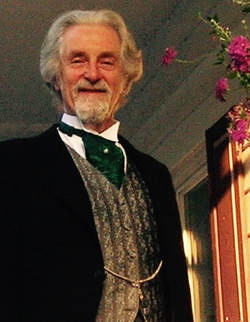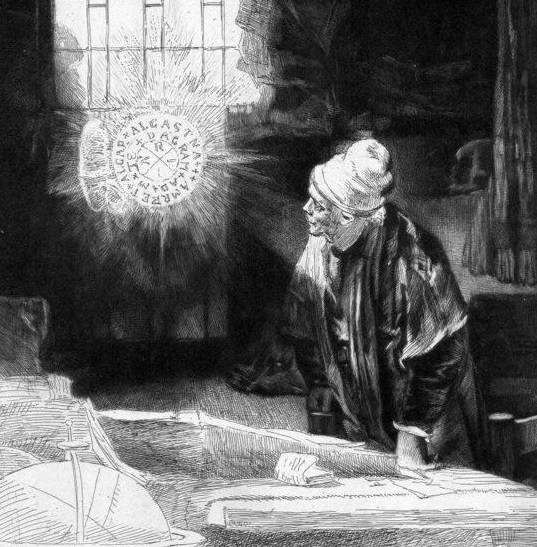 Submitted by BRENCIS CYRUS -... on
Submitted by BRENCIS CYRUS -... on

While fiction authors may, and almost always do, create their own definitions for these terms, there are actual, real-world definitions and usages.
- Homo neuter magus or wizard
- Homo ater magus or warlock
- Homo albus magus or witch
- Homo veneficus magus or sorcerer
Wizard - Derived from a word meaning “wise,” this almost always refers to a man who is skilled in some art or skill. Often refers to a magic users, and normally implies that he is a good guy. I’ve never heard anyone introduce himself as a wizard, but have seen it used in written works and it normally is offered as an alternative to Witch when referring to a man.
Warlock - Normally describes a bad guy. The word is derived from waerloga, meaning traitor or liar. Supposedly first used to refer to men who had converted to Christianity and then ratted out the other members of their coven or grove. Still, there are some Scotch pagan traditions who refer to their male members as warlocks and insist that it is an honorable title.
Sorcerer - Normally somewhat interchangeable with wizard, but often referring to a bad guy. Always means a magic user. Another term I’ve never heard anyone use to describe themselves. Derived from words meaning conjurer of evil spirits or teller of fortunes by lot.
Witch - This one is even harder to pin down, as scholars cannot agree where the word came from. The Oxford English Dictionary says it is of “uncertain origin.” While it commonly refers to the image of an old woman dressed in black and wearing a conical peaked hat, that’s far from the only current definition. This may be referred to as a Gothic witch - or a Disney witch, as that’s where we’ve seen the image a lot. There are also people who call themselves hedge witch or kitchen witch. They often concern themselves with herbal cures and other alternative healing modalities, and may follow any religious path or none at all. Then there are the followers of Wicca who call themselves Witch. Note the capital W. They are practitioners of a neo-Pagan religion, which has no fixed theology or practices. It is normally explained as being an earth oriented religion, and its followers seek balance and attempt to live in harmony with their environment. They may or may not practice magic of any sort, but their goal in such practice is healing, prosperity, or some other constructive end. They specifically do NOT worship The Devil or Satan or any such god of evil.
The above only refers to the use of the word witch in Western societies, with the exception of the native cultures of the New World. In those, as well as African or Asian cultures, a witch is normally considered the embodiment of evil and a person who will do nothing but harm to anyone for little or no reason. At the same time, most cultures also recognize figures such as the curandero/a of Latin America, who is an herbal healer or the like.
Mage - The English version of the Latin magus (magician), which came from the Greek magos (learned, priestly class). Another virtual synonym for wizard, and definitely a magic user. Little used in current speech, and normally only found in fantasy novels. The term may be used to denote a specific rank in ceremonial magic societies, however.
My comments about the derivations of these words come from the Online Etymological Dictionary, which normally references the OED, which is the default standard for definition and roots of the English language. For usage, I quote my own experience of meeting Pagans and students of the esoteric from all across the USA over a period of more than 40 years.- Skip Tarrant https://www.quora.com/What-are-the-differences-between-a-wizard-a-warlock-a-sorcerer-a-witch-and-mage
Famous real life magical participants:
Raymond Buckland

“The Father of American Wicca,” was deeply impressed by modern Gardnerian Wicca.
A veteran of witchcraft, Buckland has been involved in covens since the ’60s, usually as a leader. He is a Wiccan priest and a revered expert in all things neo-pagan. Until his retirement from active witchcraft in 1992, he spent decades as the most recognizable spokesman and the foremost expert of the craft. Ray passed away on September 27, 2017. He lived an incredible life. He was creative, talented, intelligent, fun, kind, and one of the nicest people you could ever meet! He started reading books at a young age, and quickly developed into a voracious reader. He also began writing at a young age, and started typing his stories on his father's typewriter. His father was a writer and creative person. Ray became interested in Spiritualism and all things occult at age 12 and, as they say, the rest is history! You can look on the Internet and find his story - it's become very well-known.
Ray was a writer, teacher, speaker, lecturer, musician (guitar, banjo), artist, husband, father, grandfather, great-grandfather, friend, mentor, tarot card reader, medium, psychic, clairvoyant, spiritual leader and trailblazer, respected elder, comedy writer and stand-up comedian, actor, Corvette enthusiast, and world traveler. He (aka Count Rudolph) had his own Dixieland Jazz Band in London from 1955 till 1959 (he also played the trombone). He worked for British Airways for ten years when he first came to America. He owned his own businesses. He published his own magazines and newsletters. In the 1980's, he created and ran a popular correspondence mystery school. At one time he flew his own small aircraft. He was on television, both nationally and internationally, and did a lot of radio. He was interviewed for newspapers, magazines, and podcasts. He lived in New York during the 1960's and 1970's, he lived in California in the 1980's, and also lived in Virginia Beach, New Hampshire, and then Ohio for 25 years and until his death.
Besides writing books (over fifty of them, translated into 17 foreign languages), he collected books. Lots of books! Ray collected books all his life. He brought several with him when he came to the United States, and his collection continued to grow. Since he was an author and also a Virgo (!), his books were kept in the very best condition. There are many rare, signed, and also first edition books on the Occult, Witchcraft, Magick, Supernatural, Shamanism, Divination, Mythology, and so on. It is truly a magickal collection...a magickal library. - http://www.bucklandlibrary.com/
Laurie Cabot

Laurie Cabot (born March 6, 1933) is an American Witchcraft high priestess, and the author of several books. She founded the Cabot Tradition of the Science of Witchcraft and the Witches' League for Public Awareness to defend the civil rights of witches everywhere. She lives in Salem, where she owned a shop. Cabot claims to be related to the prominent Boston Brahmin Cabot Family. Laurie Cabot was born Mercedes Elizabeth Kiersey. She grew up in California and came east to New Englandas a teenager. She maintains that her interest in th eoccult began in childhood Cabot married and divorced twice, with each marriage producing a daughter. Cabot chose to raise her daughters as Witches, and she began appearing in black robes and black eye-makeup in her everyday life. She identifies herself as a Witch, but not as a follower of the modern Wiccan religion, as she practiced Witchcraft before Wicca became a popular movement. The kind of Witchcraft that Cabot practices focuses on the Art and Science of Witchcraft. Laurie Cabot opened the town's first "Witch Shoppe" in Salem in 1971, which became a tourist destination thanks to the national TV exposure. Cabot remains a national celebrity.
Abramelin the Mage

https://occult-world.com/abramelin-the-mage/
Abramelin the Mage (1362–1460) was a Jew from Würzburg, Germany, Abraham, or Abramelin (also spelled Abra-melin), created a body of magical works that for centuries influenced magicians, including Aleister Crowley.
An expert on the Kabbalah, Abramelin said he learned his magical knowledge from Angels who told him how to conjure and tame demons into personal servants and workers, and how to raise storms. He said that all things in the world were created by demons, who worked under the direction of angels, and that each individual had an angel and a demon as Familiars. . The basis for his system of magic, he said, may be found in the kabbalah.
According to lore, Abramelin created 2,000 spirit cavalrymen for Frederick, elector of Saxony. He also is said to have aided an earl of Warwick in his escape from jail and helped save the antipope John XXIII (1410–15) from the Council of Constance.
The magic of Abramelin allegedly is contained in a manuscript,The Sacred Magis of Abramelin the Mage, actually a collection of three books. The manuscript was written in French in the 18th century but claims to be a translation of Abramelin’s original manuscript in Hebrew, dated 1458.
It was translated into English around the turn of the 20th century byS.L. MacGregor Mathers, one of the early and most influential members of theHermetic Order of the Golden Dawn. Crowley borrowed from the book for his own rituals to master Demons, andGerald B. Gardner used it as a source for his Book of Shadows.
Abramelin magic is similar to that found in The Key of Solomon, considered the leading magical grimoire. It is based on the power of numbers and sacred names and involves the construction of numerous magical squares for such purposes as invisibility, Flying, commanding spirits, Necromancy, shape shifting and scores of other feats. rituals for conjuring spirits, creating magic squares and making seals and sigils are elaborate and must be followed exactly in accordance with astrological observances.- https://occult-world.com/abramelin-the-mage/
- 486 reads